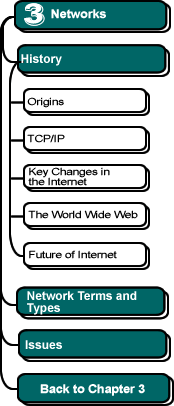

|
Distributed
Networks
In consideration of this dilemma, the IPTO researchers turned to recent research done by Paul Baran at RAND corporation on the concept of "distributed" networks.
In a centralized network, there is only one path from a given node to another, namely the one through the central circuit-switching point.
A distributed network is one that has no single, central connection point. Rather, each of the nodes is of equal importance: each node is able to send and receive information and is also able to serve as a router of information to other nodes. Thus, there are multiple possible paths from any one node on the network to any other node.
 In
some sense, this redundancy makes a distributed network
less efficient than a centralized network. However, this also makes this
network very robust (resistant to failure). If one node
on the network is not operating, the routing computer simply directs the
information along a different route to the destination. Thus, even if
a large portion of a distributed network fails, the rest of the nodes
on the network can still communicate.
In
some sense, this redundancy makes a distributed network
less efficient than a centralized network. However, this also makes this
network very robust (resistant to failure). If one node
on the network is not operating, the routing computer simply directs the
information along a different route to the destination. Thus, even if
a large portion of a distributed network fails, the rest of the nodes
on the network can still communicate.
 In
some respects this is similar to the way long-distance truckers use CB
radios: when they hear of a traffic jam ahead on the highway, they reroute.
It may mean having to travel extra miles, but all that matters is getting
to the destination.
In
some respects this is similar to the way long-distance truckers use CB
radios: when they hear of a traffic jam ahead on the highway, they reroute.
It may mean having to travel extra miles, but all that matters is getting
to the destination.
![]()
![]()
This chapter was written by Jeff Nyhoff and Joel Adams. Copy editing by
Nancy Zylstra
©2005 Calvin University (formerly Calvin College), All Rights Reserved
If you encounter technical errors, contact computing@calvin.edu.